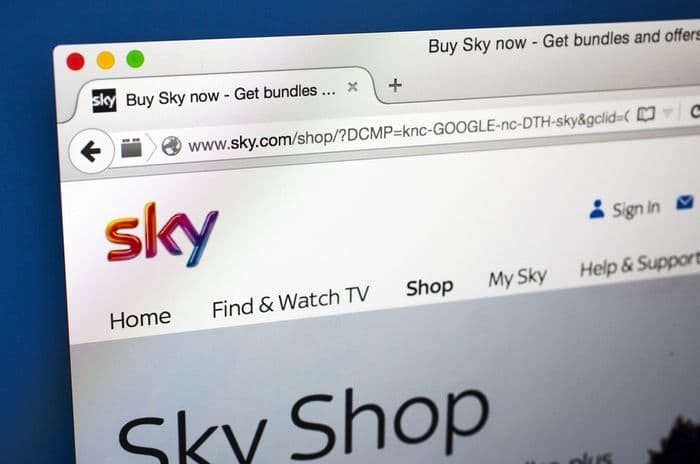Home > Broadband > News > Sky drop free Broadband Lite package
Sky drop free Broadband Lite package
SKY have quietly removed their completely free 2GB Broadband Lite package from service, and replaced it with a meatier 12GB package.

The new deal will cost £5 a month, but new customers getting Sky TV, Talk and Broadband on a 12-month minimum contract will get Sky Broadband 12GB free for the first year.
As the deal relies on taking a landline from Sky, customers will also need to factor in line rental of £17.40 per month.
At the time of writing, we were waiting to hear from Sky as to what would happen to existing Lite users.
Inevitable demise
Given how much more data we're now using compared with just a few years ago, it's no surprise that Sky have decided to ditch the Lite package, which they only ever offered as a bonus option for those already taking both TV and landline.
Offering as it did the UK's smallest monthly download limit over a fixed line, it was increasingly suited to only the lightest of users - ideal perhaps for those who send and receive the occasional email, but very few others.
For example, Ofcom say that in 2014 the average household got through 58GB of data per month; in 2015 that had rocketed to 82GB a month.
Everyone - even those of us who don't think we are - is using more data, so the move to a higher "light use" limit seems practical.
But while the 12GB cap is better than 2GB, it's still only really suited to those who'd consider themselves light internet users - and the new version is not totally free.
As with the Lite package, anyone considering the 12GB option should be aware that the onus is on them to stay below the cap.
Sky say that customers who exceed the data limit twice in any six months will be upgraded to Sky Broadband Unlimited, although they will be warned about their excess usage and any resulting change to their package before this happens.
As yet it's not clear whether those who have Sky Broadband Lite will be able to stay on that deal, or whether they'll be transferred to the new package - and if so, whether they'll need to pay from the outset or will get 12 months free.
Filtered by default
In the meantime, completely new customers should also be aware that there's been another rather significant change to Sky's broadband.
As promised last December, Sky's parental control filter - Sky Broadband Shield - is now being switched on automatically for all new connections.
New customers won't notice that it's on until they first try to access a filtered website, at which point they'll be asked if they wish to amend the settings or turn the shield off altogether.
The default filter is set so that users will only be able to visit sites suitable for those aged 13 and under until 9pm in the evening.
After the watershed, sites with an 18 rating will become available.
This brings internet use in line with Ofcom's rules regarding TV programmes; namely, that "material unsuitable for children should not, in general, be shown before 9pm".
Active choice
Lyssa McGowan, Sky's Brand Director of Communications Products, says that their "Auto On" approach results in a "much greater use" of filtering, with trials offering filtering by default in 2015 resulting in 67% of households continuing to use the service.
All the biggest ISPs have to offer their customers an "active choice" regarding internet filtering, but normally customers are asked whether they'd like to turn the filters on - usually as part of the broadband activation process - rather than being asked if they'd like to turn them off.
That has led to uptake results that seem far less impressive - in their fourth Internet Safety Report [pdf], published late last year, Ofcom said that the proportion of customers choosing to activate their ISP's filters was less than half that shown by Sky.
Ms McGowan says that, in an echo of last year's drive to engage users, Sky will be contacting millions of existing Sky Broadband customers in the coming months who've yet to make a decision about filtering.
"If they don't respond, we will turn it on automatically," she says.
Those who want to subsequently amend the settings or turn it off can do so by logging into their accounts and adjusting the controls.
Government influence
When they first announced that they'd be automatically filtering new broadband connections, Sky told us that they were following the lead of the Government, who were leaning towards a "default on" model of filtering.
This may not be explicitly stated in the Digital Economy Bill currently progressing through Parliament, but as it contains the "requirement" that pornographic material not be accessible to those under 18, the ISPs may feel extra pressure to protect both themselves and their users by making greater use of age-based filtering.
When we spoke to the big four ISPs in December, BT, TalkTalk and Virgin said they'd stick with the methods they were using.
But as the Digital Economy Bill progresses, and with Sky's largely positive results - whatever the reason for them - it'll be interesting to see if they feel more compelled to follow suit, or continue trying to get users to think for themselves about the protection they want.
Get insider tips and the latest offers in our newsletter

We are independent of all of the products and services we compare.

We order our comparison tables by price or feature and never by referral revenue.

We donate at least 5% of our profits to charity, and we aim to be climate positive.
Latest News

11 December 2025
Virgin Media offer Meta Ray-Bans with TV bundles
11 December 2025
Government rules out ban on mid-contract price hikes
24 November 2025
CityFibre delivers full-fibre freedom to Hull with 30+ ISPsGet insider tips and the latest offers in our newsletter



Comments (1)